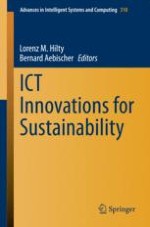
2015 | OriginalPaper | Chapter
ICT for Sustainability: An Emerging Research Field
Authors : Lorenz M. Hilty, Bernard Aebischer
Published in: ICT Innovations for Sustainability
Publisher: Springer International Publishing
Activate our intelligent search to find suitable subject content or patents.
Select sections of text to find matching patents with Artificial Intelligence. powered by
Select sections of text to find additional relevant content using AI-assisted search. powered by